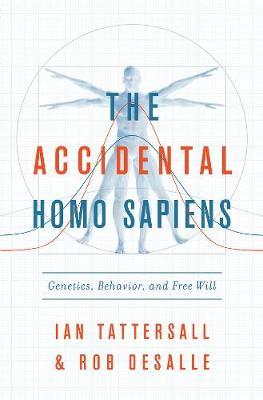Accidental Homo Sapiens

Accidental Homo Sapiens
With our enormous, close-packed, and seemingly inexorably expanding population, humanity has fallen under the influence of the famous (or infamous) "bell curve." Ian Tattersall and Rob DeSalle's revelatory new book explores what the future of our species could hold, while simultaneously revealing what we didn't become--and what we won't become.
A cognitively unique species, and our actions fall on a bell curve as well. Individual people may be saintly or evil; generous or grasping; narrow-minded or visionary. But any attempt to characterize our species must embrace all of its members and so all of these antitheses. It is possible not just for the species, but for a single individual to be all of these things--even in the same day. We all fall somewhere within the giant hyperspace of the human condition that these curves describe.
The Accidental Homo Sapiens shows readers that though humanity now exists on this bell curve, we are far from a stagnant species. Tattersall and DeSalle reveal how biological evolution in modern humans has given way to a cultural dynamic that is unlike anything else the Earth has ever witnessed, and that will keep life interesting--perhaps sometimes too interesting--for as long as we exist on this planet.
PRP: 202.17 Lei
Acesta este Prețul Recomandat de Producător. Prețul de vânzare al produsului este afișat mai jos.
181.95Lei
181.95Lei
202.17 LeiIndisponibil
Descrierea produsului
With our enormous, close-packed, and seemingly inexorably expanding population, humanity has fallen under the influence of the famous (or infamous) "bell curve." Ian Tattersall and Rob DeSalle's revelatory new book explores what the future of our species could hold, while simultaneously revealing what we didn't become--and what we won't become.
A cognitively unique species, and our actions fall on a bell curve as well. Individual people may be saintly or evil; generous or grasping; narrow-minded or visionary. But any attempt to characterize our species must embrace all of its members and so all of these antitheses. It is possible not just for the species, but for a single individual to be all of these things--even in the same day. We all fall somewhere within the giant hyperspace of the human condition that these curves describe.
The Accidental Homo Sapiens shows readers that though humanity now exists on this bell curve, we are far from a stagnant species. Tattersall and DeSalle reveal how biological evolution in modern humans has given way to a cultural dynamic that is unlike anything else the Earth has ever witnessed, and that will keep life interesting--perhaps sometimes too interesting--for as long as we exist on this planet.
Detaliile produsului










